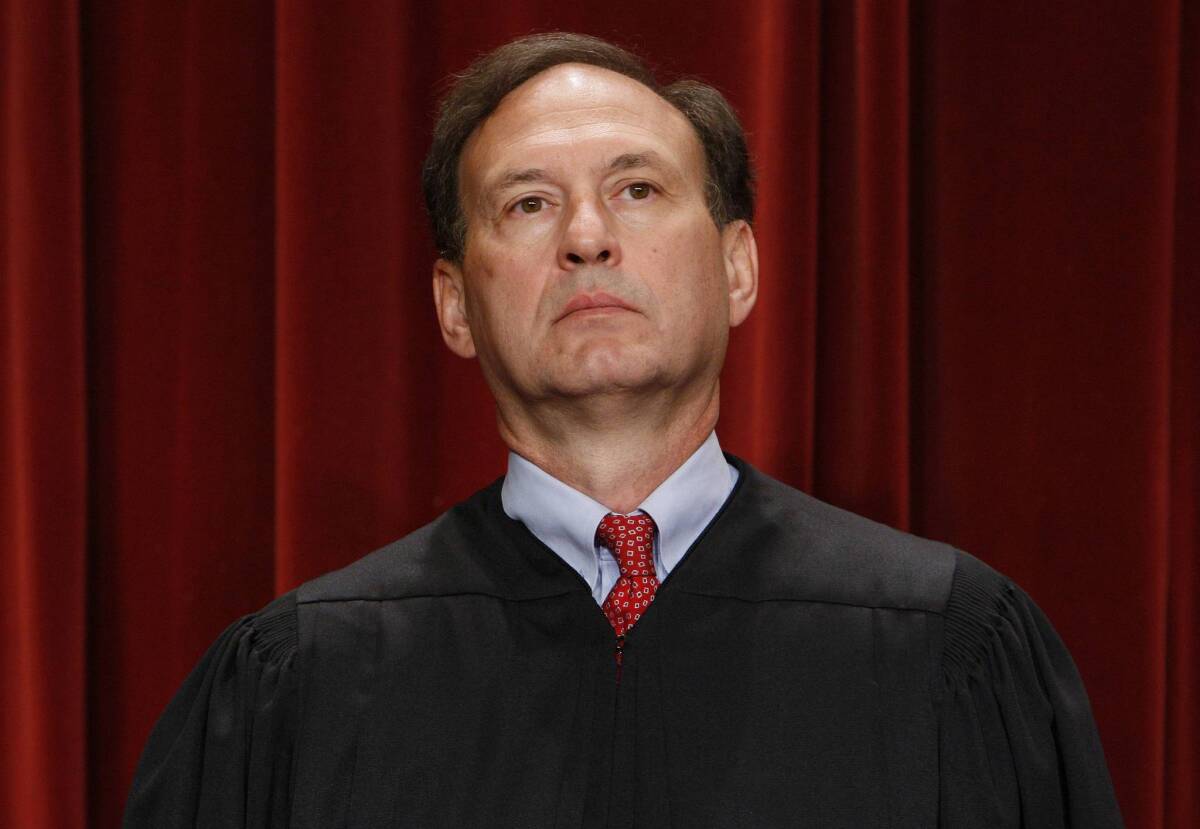Alito’s Federalist Society speech was bad for the Supreme Court

- Share via
The present and future of the Supreme Court have become — disquietingly — a political issue.
President Trump, who still hasn’t acknowledged his loss to Joe Biden, is on record urging the Senate to confirm a replacement for Justice Ruth Bader Ginsburg to help resolve any challenges to the vote count in the presidential election. Meanwhile, Biden is under pressure from progressives to endorse an expansion of the court to reverse its conservative jurisprudence — so-called “court-packing.”
Justice Samuel A. Alito Jr., a George W. Bush appointee and a contentious conservative on the court, walked — or Zoomed — into this maelstrom Thursday night when he addressed the National Lawyers Convention of the Federalist Society.
In his speech, Alito spoke softly but wielded several big rhetorical sticks:
He argued that COVID-19 restrictions had led to previously unimaginable restrictions on freedom.
He lambasted five Democratic senators for filing a brief suggesting that the court might have to be “restructured” if it didn’t mend its ways.
He made exaggerated claims about the silencing of Americans who have religious objections to same-sex marriage.
He expressed satisfaction about the failure of a proposed rule to bar federal judges from membership in the Federalist Society (and its liberal version, the American Constitution Society). He also suggested, unpersuasively, that had the proposed rule been adopted, the next step would have been to prevent judges from speaking at Federalist Society events.
The reform group Fix the Court complained that Alito’s speech was “more befitting a Trump rally than a legal society.”
That’s an exaggeration too; a lot of what Alito said would have been over the heads of a lot of Trump supporters (or Biden supporters, for that matter). But his comments, some of which channeled concerns he has raised in opinions on the court, certainly mapped on to the Trump agenda. For example, the president and Atty. Gen. William Barr also have expressed concern about shutdown policies that interfered with worship.
Fix the Court suggests that Alito’s speech is proof that Supreme Court justices should be bound by an ethics code. Chief Justice John G. Roberts Jr. has said that, while the Code of Conduct for United States Judges doesn’t apply to the high court, justices “do in fact consult the Code of Conduct in assessing their ethical obligations.”
Whether Alito’s speech violated the letter or spirit of these canons is debatable. If appearing before an ideological lawyers group is improper, he has some company. Ginsburg gave the keynote speech at the 2003 convention of the American Constitution Society. (Ginsburg’s speech, about international law, was far less politically provocative than Alito’s.)
Alito arguably may have run afoul of one provision of the code — the admonition not to comment on matters pending before the courts — because challenges to COVID-19 restrictions on religious groups are ongoing. This week the Catholic Diocese of Brooklyn asked the Supreme Court to block an order by Gov. Andrew Cuomo limiting attendance at houses of worship.
But even if Alito’s speech wasn’t unethical, it was injudicious in the extreme, and not only because of its pugilistic content. The audience mattered too.
You don’t have to subscribe to liberal conspiracy theories about the Federalist Society to recognize that the group is widely perceived as political even though, as Alito noted, it doesn’t take positions on issues or lobby or testify before Congress or file briefs in the Supreme Court. Leonard Leo, the co-chairman of the society’s board of directors, played such an influential role in advising Trump on his Supreme Court nominations that there were complaints that Trump had “outsourced” his appointments to the group. (If so, that was preferable to Trump choosing unqualified cronies, as I wrote here.)
Yes, the Federalist Society sponsors educational programs that often include legal and political progressives. This year’s convention included a discussion of freedom of speech and “cancel culture” that featured Prof. Robert George of Princeton, a conservative, and Prof. Cornel West of Harvard, a progressive.
But the organization isn’t just a debating society. It also provides a social and professional network for conservative lawyers and law students and a pulpit for conservative judges.
Alito isn’t the first to hurl anathemas from that pulpit. In a now-famous speech at the 1992 Federalist Society convention, Laurence H. Silberman, a judge on the U.S. Court of Appeals for the District of Columbia Circuit, inveighed against reporters who covered the Supreme Court for “asserting the value of judicial activism,” a phenomenon he labeled the Greenhouse Effect, a snide reference to New York Times reporter Linda Greenhouse.
For a Supreme Court justice, addressing a convention of the Federalist Society — or the American Constitution Society, which is now headed by former Democratic U.S. Sen. Russ Feingold — is not the same as speaking at a law school. If justices don’t want to be perceived as politicians, they should be careful not only about their words but where they say them.
More to Read
A cure for the common opinion
Get thought-provoking perspectives with our weekly newsletter.
You may occasionally receive promotional content from the Los Angeles Times.










